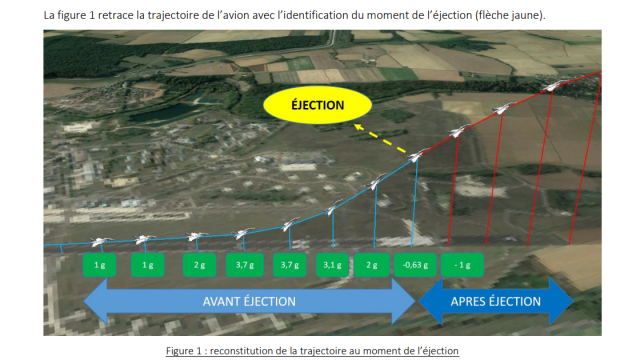It’s happened to all of us: You’re unexpectedly pressured to fly around in a military fighter jet despite your lack of aviation experience before you accidentally mash that eject button.
That scenario is exactly what occurred last March at an airbase in Saint-Dizier, France, according to a French government report released this month. Colleagues of a 64-year-old man at a French defence contractor surprised him with special ministerial approval to ride along in the twin seat of a Dassault Rafale B fighter jet on a training exercise in Saint-Dizier on March 20, 2019. The man reportedly had never expressed interest in doing so and was terrified, but did not want to disappoint his coworkers.
Per CNN, investigators found from data on the unfortunate passenger’s smartwatch that “his heart was in full tachycardia” (at 136 to 142 beats per minute) before he boarded the flight. During the three-plane training exercise, the man became understandably alarm and gripped an object in the cockpit—that unfortunately happened to be the Rafale B’s ejector seat controls. Despite losing his helmet and ejecting at over 2,500 feet, the individual landed on the ground near the German border without sustaining serious injury; the report mentions that his face showed “traces left by pyrotechnic powder residue.” The pilot safely landed the jet, despite suffering some contusions to his face.
[referenced url=” thumb=” title=” excerpt=”]
The man in question had underwent a medical examination just four hours before takeoff rather than the typical 10 days, according to BuzzFeed News, and apparently did not absorb much from a safety briefing where the ejector seat functionality was explained. Additionally, neither he or the pilot were aware the doctor who performed the exam had recommended the passenger not be exposed to a negative gravitational load factor. That makes occupants feel as though they are upside down and occurred shortly after takeoff, when the pilot started to cut his ascent.
A product brochure for the Martin-Baker F16F ejection seat used in Rafale fighter jets says that it “achieves its remarkably light weight by combining the twin catapult outer cylinder tubes
as both propulsion system and as the seat’s primary structure.”
“This situation generated a feeling of stress for the passenger, which was particularly felt during the ejection seat briefing where he had to absorb a large amount of information in a very short time,” investigators wrote, according to BuzzFeed. “… Discovering the feeling of the negative load factor, the insufficiently strapped and totally surprised passenger held onto the ejector handle and activated it unintentionally.”
According to the Guardian, judicial and defence investigations into the incident continue. However, investigators wrote in the report that alongside myriad technical and procedural failings one of the primary causes of the incident was the peer pressure the passenger felt to ride along in the jet, despite a complete lack of military aviation experience. They also wrote that the practice of rushing VIPs onto flights shortly after their medical examinations was growing, despite its detrimental effect on safety, and that ground and flight crews had not ensured that he had worn his equipment or strapped himself into the seat correctly.
